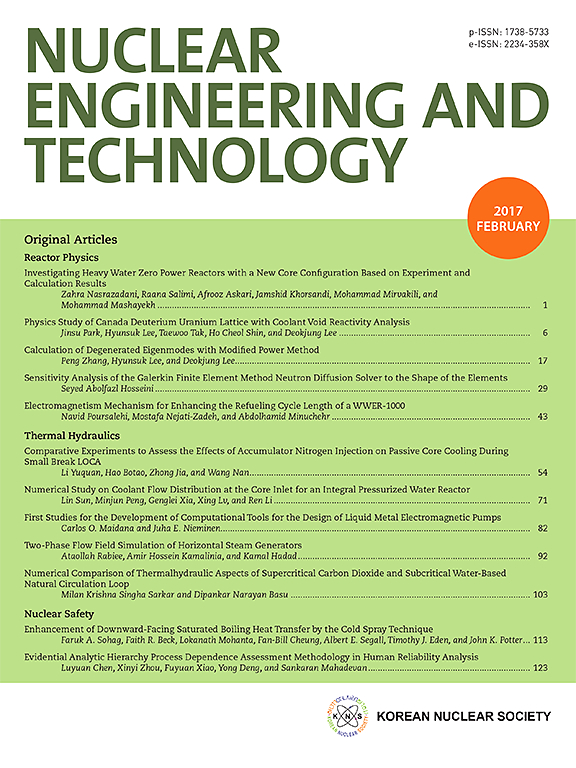熔氯快堆核保障的核素库存分析和裂变产物监测
IF 2.6
3区 工程技术
Q1 NUCLEAR SCIENCE & TECHNOLOGY
引用次数: 0
摘要
裂变产物分析为实时监测熔融氯化物快堆中裂变物质的演变和突然变化提供了一种强大的手段,在熔融氯化物快堆中,传统的保障技术受到持续循环燃料的挑战。在本研究中,使用SCALE 6.3.1与TRITON-Shift和ORIGEN进行了时间相关的耗尽模拟,以量化不同操作场景下的裂变产物,包括一次通过和增殖-燃烧模式。结果表明,燃料盐中的Nd和Sm是235U/239Pu比值变化的滞后指标,而废气中的Kr快速反映了可裂变同位素组成的变化。此外,尽管Xe对特定同位素的依赖性较弱,但它被证明可以有效地跟踪反应堆的总体功率。这些发现表明,有针对性的裂变产物监测可以捕捉到逐渐的成分演变和钚转移等快速扰动,从而提高对先进熔盐反应堆的操作意识和保障信心。本文章由计算机程序翻译,如有差异,请以英文原文为准。
Nuclide inventory analysis and fission product monitoring for nuclear safeguards in molten chloride fast reactors
Fission product analysis offers a powerful means to real-time monitoring of fissile material evolution and sudden alterations in Molten Chloride Fast Reactors, where conventional safeguards techniques are challenged by continuously circulating fuel. In this study, time-dependent depletion simulations were employed using SCALE 6.3.1 with TRITON-Shift and ORIGEN to quantify fission product under varied operational scenarios, including once-through and breed-and-burn modes. The results demonstrate that Nd and Sm in the fuel salt serve as delayed indicators of shifting 235U/239Pu ratios, while Kr in the off-gas stream rapidly reflects changes in fissile isotope composition. Additionally, Xe proves effective for tracking overall reactor power despite its weaker dependence on specific isotopes. These findings establish that targeted fission product monitoring can capture both gradual compositional evolutions and rapid perturbations such as plutonium diversion, thereby offering enhanced operational awareness and safeguards confidence in advanced molten salt reactors.
求助全文
通过发布文献求助,成功后即可免费获取论文全文。
去求助
来源期刊

Nuclear Engineering and Technology
工程技术-核科学技术
CiteScore
4.80
自引率
7.40%
发文量
431
审稿时长
3.5 months
期刊介绍:
Nuclear Engineering and Technology (NET), an international journal of the Korean Nuclear Society (KNS), publishes peer-reviewed papers on original research, ideas and developments in all areas of the field of nuclear science and technology. NET bimonthly publishes original articles, reviews, and technical notes. The journal is listed in the Science Citation Index Expanded (SCIE) of Thomson Reuters.
NET covers all fields for peaceful utilization of nuclear energy and radiation as follows:
1) Reactor Physics
2) Thermal Hydraulics
3) Nuclear Safety
4) Nuclear I&C
5) Nuclear Physics, Fusion, and Laser Technology
6) Nuclear Fuel Cycle and Radioactive Waste Management
7) Nuclear Fuel and Reactor Materials
8) Radiation Application
9) Radiation Protection
10) Nuclear Structural Analysis and Plant Management & Maintenance
11) Nuclear Policy, Economics, and Human Resource Development
 求助内容:
求助内容: 应助结果提醒方式:
应助结果提醒方式:


